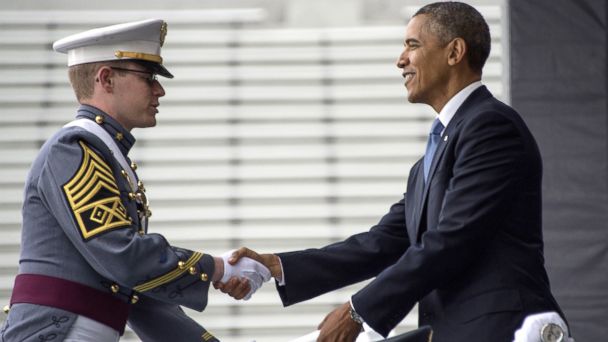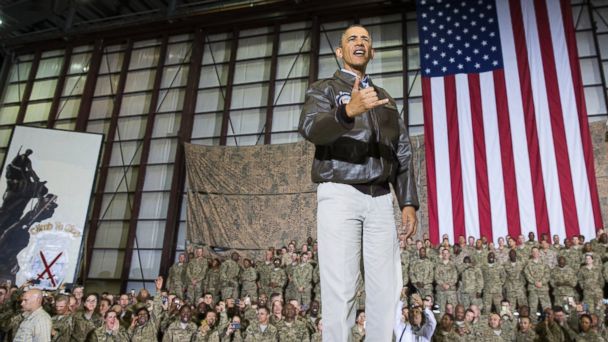Five Ways Obama Wants To Change Foreign Policy
In a speech to West Point graduates today, President Obama laid out his foreign policy vision for the final two years of his presidency as the country emerges from what he described as a "long season of war."
"The United States is and remains the one indispensable nation. That has been true for the century passed, and it will be true for the century to come," the president told over 1,000 graduating cadets at West Point.

(Jim Watson/AFP/Getty Images)
Here's a look at five ways President Obama plans on approaching foreign policy as he rounds out his final years in the White House.
1. MILITARY FORCE ISN'T THE ONLY ANSWER
Obama made clear that full-scale military operations aren't the only means of combating terrorism or maintaining an international presence.
"America must always lead on the world stage. If we don't, no one else will. The military that you have joined is, and always will be, the backbone of that leadership," the president said. "But U.S. military action cannot be the only - or even primary - component of our leadership in every instance. Just because we have the best hammer does not mean that every problem is a nail."
"For the foreseeable future, the most direct threat to America at home and abroad remains terrorism. But a strategy that involves invading every country that harbors terrorist networks is naïve and unsustainable," he later added.
2. BUT 'CORE INTERESTS' MAY DEMAND MILITARY FORCE
The president said there will still be instances where military force will be necessary "when our core interests demand it." But he stressed the need to work more closely with our international partners when considering military options abroad.
"The United States will use military force, unilaterally if necessary, when our core interests demand it - when our people are threatened; when our livelihood is at stake; or when the security of our allies is in danger," the president said. "On the other hand, when issues of global concern that do not pose a direct threat to the United States are at stake - when crises arise that stir our conscience or push the world in a more dangerous direction - then the threshold for military action must be higher. In such circumstances, we should not go it alone."
3. FOCUS ON EMERGING THREATS, PARTICULARLY SYRIA
The president asked Congress to help counter-terrorism efforts by authorizing a new Counter-Terrorism Partnerships Fund, which would provide up to $5 billion to "train, build capacity, and facilitate partner countries on the front lines" in countries like Yemen, Somalia, and Libya.
But Obama also urged that particular attention be paid to the war torn country of Syria. The president defended his decision not to send American troops to Syria and vowed to increase support to the opposition and aid neighboring countries which are hosting refugees and trying to keep terrorists from crossing their borders.
"I made a decision that we should not put American troops into the middle of this increasingly sectarian civil war, and I believe that is the right decision. But that does not mean we shouldn't help the Syrian people stand up against a dictator who bombs and starves his people," he said. "And in helping those who fight for the right of all Syrians to choose their own future, we are also pushing back against the growing number of extremists who find safe-haven in the chaos."
The president did not detail whether support to the opposition in Syria would include military training or arms.

Evan Vucci/AP Photo
4. WIND DOWN TROOPS IN AFGHANISTAN
The president's speech at West Point came one day after he announced plans to keep 9,800 troops in Afghanistan after 2014 and effectively withdraw them by the end of 2016. As he addressed the thousand graduating cadets, Obama noted this may be the first class since 9/11 which won't head into combat in Iraq and Afghanistan.
"This is a particularly useful time for America to reflect on those who have sacrificed so much for our freedom, a few days after Memorial Day. You are the first class to graduate since 9/11 who may not be sent into combat in Iraq or Afghanistan," he told the graduating cadets.
5. INCREASE TRANSPARENCY
Obama also discussed the need to increase transparency to gain support and trust both at home and internationally.
"I also believe we must be more transparent about both the basis for our actions, and the manner in which they are carried out - whether it is drone strikes or training partners. I will increasingly turn to our military to take the lead and provide information to the public about our efforts," he said. "Our intelligence community has done outstanding work and we must continue to protect sources and methods. But, when we cannot explain our efforts clearly and publicly, we face terrorist propaganda and international suspicion; we erode legitimacy with our partners and our people; and we reduce accountability in our own government."